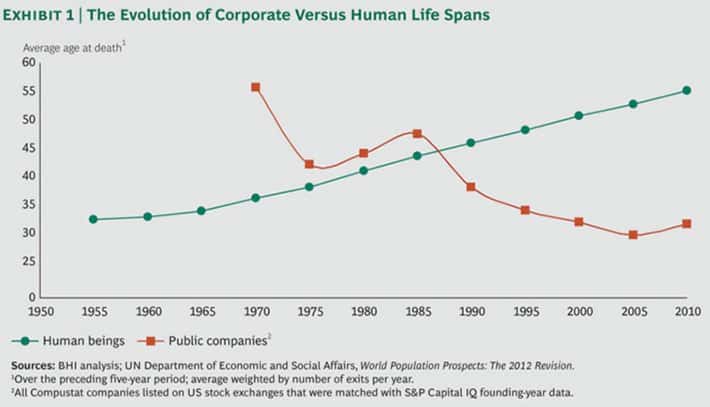What We’re Reading
Here are a few good articles the Collaborative Fund team came across this week.
Supply and demand
Stanford came up with a great idea to make sure its alumni don’t all stay in the Bay Area:
A new fellowship at the Stanford Graduate School of Business covers tuition and fees for MBA students. But the program comes with a catch: Students must be willing to take a job in the Midwest.
Life expectancy
Here’s how human lifespans have been rising while corporate lifespans have been falling:

Junk science
This is a fascinating article on how science’s urge to publish has incentivized poor studies:
Run many small and statistically weak studies. Tweak your methods on the fly to ensure positive results. If you get negative results, sweep them under the rug. Never try to check old results; only pursue new and exciting ones. These are not just flights of fancy. We know that such practices abound. They’re great for getting publications, but they also pollute the scientific record with results that aren’t actually true. As Richard Horton, editor of The Lancet once wrote, “No one is incentivized to be right. Instead, scientists are incentivized to be productive.”
Pragmatism
Lee Kuan Yew, former prime minister of Singapore, shares his thoughts on theory vs. results:
My life is not guided by philosophy or theories. I get things done and leave others to extract the principles from my successful solutions. I do not work on a theory. Instead, I ask: what will make this work? If, after a series of solutions, I find that a certain approach worked, then I try to find out what was the principle behind the solution. So Plato, Aristotle, Socrates, I am not guided by them…I am interested in what works…Presented with the difficulty or major problem or an assortment of conflicting facts, I review what alternatives I have if my proposed solution does not work. I choose a solution which offers a higher probability of success, but if it fails, I have some other way. Never a dead end.
Trusted sources
Be careful taking polls too seriously, as this hilarious tale reminds us:
ROMER: David gets to work cooking up questions to give the polling company. The polling company does its job.
WILK: And it was the only question that we ever wrote where we ever got a response from them saying, is this actually what you want us to be polling? And we said, yes. And the question was - we were going to ask people, have you ever been decapitated?
SMITH: (Laughter). But…
WILK: They were sure we had made a mistake, and we had not.
SMITH: As far as David remembers, by the way, 4 percent of Americans answered that they had been decapitated.
ROMER: Seems high.
Motivation
Why are a shrinking number of working-age men in the labor force, or working fewer hours? One paper has an astounding explanation:
The paper attributes one-third to one-fifth of the decline in work hours by less-educated young men to the rising use of technology for entertainment — mainly video games. The new study has not yet been published in a peer-reviewed journal, and the researchers say they are continuing to refine the precise figures. But other prominent economists who reviewed it for this story said it raises important questions about why so many young men have abandoned the workforce.
Have a great weekend.